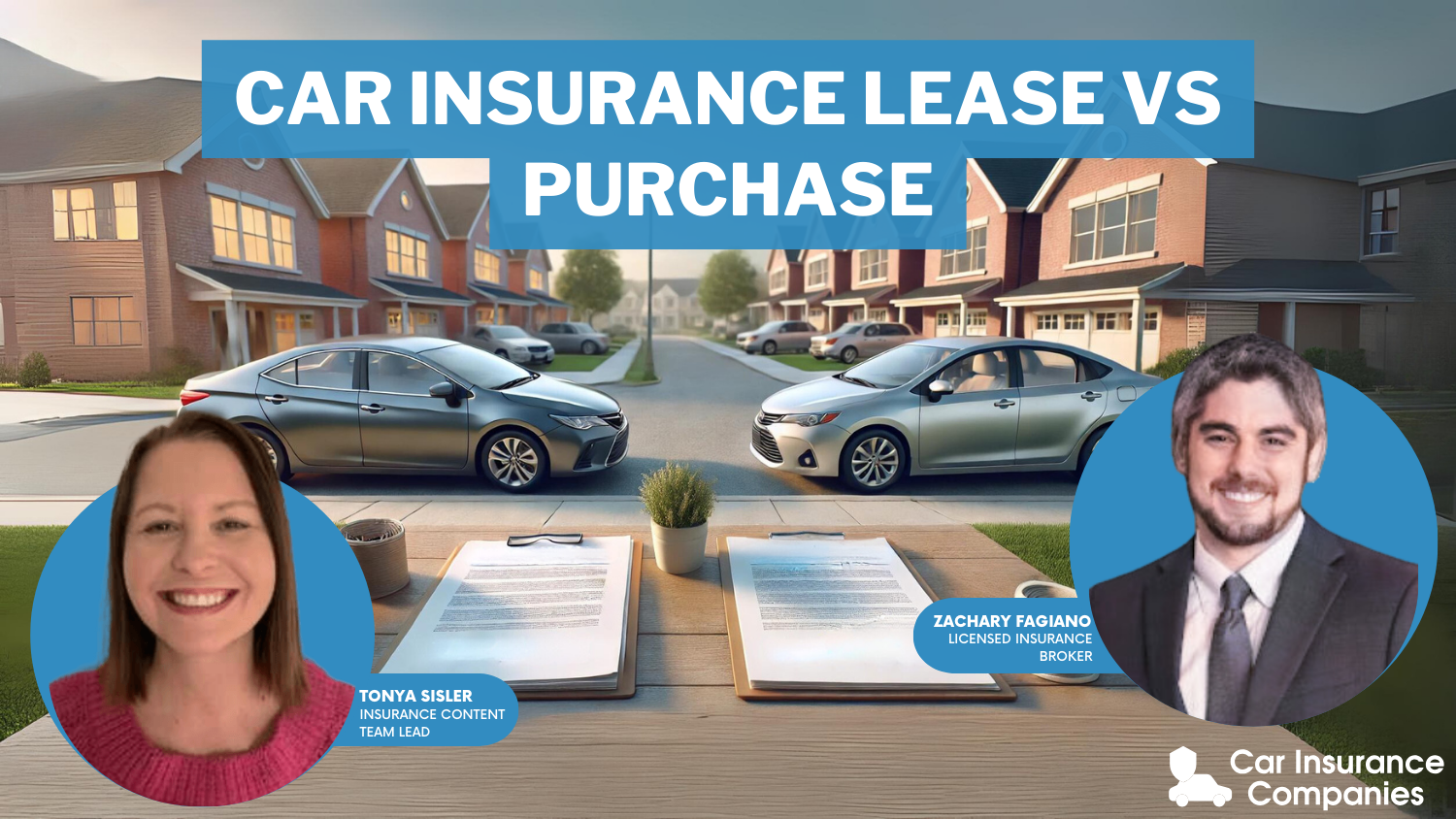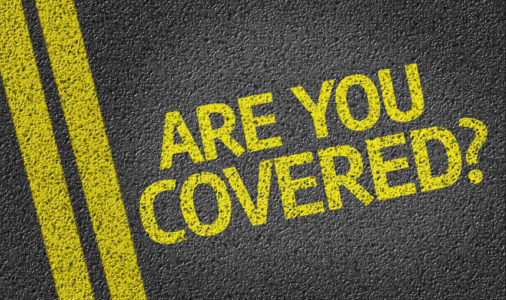Car Insurance Lease vs Purchase
Exploring the nuances of car insurance in the context of leasing versus purchasing, this article navigates the cost differentials and coverage considerations for both scenarios, shedding light on factors that influence premiums and decisions in the realm of auto insurance.

Free Car Insurance Comparison
Compare Quotes From Top Companies and Save
Secured with SHA-256 Encryption
Zach Fagiano
Licensed Insurance Broker
Zach Fagiano has been in the insurance industry for over 10 years, specializing in property and casualty and risk management consulting. He started out specializing in small businesses and moved up to large commercial real estate risks. During that time, he acquired property & casualty, life & health, and surplus lines brokers licenses. He’s now the Senior Vice President overseeing globa...
Licensed Insurance Broker
UPDATED: Nov 13, 2024
It’s all about you. We want to help you make the right car insurance coverage choices.
Advertiser Disclosure: We strive to help you make confident car insurance decisions. Comparison shopping should be easy. We are not affiliated with any one car insurance company and cannot guarantee quotes from any single company.
Our car insurance industry partnerships don’t influence our content. Our opinions are our own. To compare quotes from many different car insurance companies please enter your ZIP code on this page to use the free quote tool. The more quotes you compare, the more chances to save.
Editorial Guidelines: We are a free online resource for anyone interested in learning more about auto insurance. Our goal is to be an objective, third-party resource for everything auto insurance related. We update our site regularly, and all content is reviewed by auto insurance experts.
UPDATED: Nov 13, 2024
It’s all about you. We want to help you make the right car insurance coverage choices.
Advertiser Disclosure: We strive to help you make confident car insurance decisions. Comparison shopping should be easy. We are not affiliated with any one car insurance company and cannot guarantee quotes from any single company.
Our car insurance industry partnerships don’t influence our content. Our opinions are our own. To compare quotes from many different car insurance companies please enter your ZIP code on this page to use the free quote tool. The more quotes you compare, the more chances to save.
On This Page
Comparing car insurance options between lease and purchase decisions is crucial, and finding the right company can significantly impact your coverage rates and overall satisfaction. In this comprehensive guide on Car Insurance Lease vs. Purchase, we delve into the intricacies of coverage rates, options, discounts, and reviews to identify the best company for varying customer profiles. From individuals leasing their vehicles to those making outright purchases, we analyze which company stands out in providing the most advantageous rates tailored to different needs. Whether you prioritize affordability, extensive coverage options, or stellar customer reviews, this article breaks down the factors influencing insurance rates across companies, helping you make an informed choice that aligns with your unique preferences and circumstances.
Car Insurance for Leased Vehicles
Pros:
- Lower Premiums: Leased cars often come with lower insurance premiums.
- GAP Insurance: Many lease agreements include Guaranteed Auto Protection (GAP) insurance, covering the difference between what you owe and the car’s value.
- Limited Ownership Responsibility: Leaseholders may have fewer responsibilities for major repairs.
Cons:
- Mileage Restrictions: Leased cars often have mileage limitations, and exceeding them can result in additional charges.
- Customization Restrictions: Limited ability to personalize or modify the vehicle.
- Ownership Limitations: At the end of the lease, you don’t own the car.
Compare quotes from the top car insurance companies and save
Secured with SHA-256 Encryption
Car Insurance for Purchased Vehicles
Pros:
- Ownership: Full ownership of the vehicle, providing flexibility and freedom.
- No Mileage Restrictions: No limitations on the number of miles you can drive.
- Customization: Complete freedom to customize the vehicle as desired.
Cons:
- Higher Premiums: Purchased or financed vehicles may have higher insurance rates.
- Depreciation: The car’s value depreciates over time, impacting insurance coverage.
- Full Financial Responsibility: Owners are responsible for major repairs and maintenance costs.
Learn more about auto insurance types below and make sure to use our free insurance comparison tool above today!
Insurance Comparison: Purchasing Vehicle Stands Out
When it comes to insuring your vehicle, whether leased or purchased, understanding the unique considerations for each scenario is crucial. Considering all aspects, the flexibility and potentially lower costs associated with Purchasing vehicles outright tip the scale.
Leasing Considerations
Coverage Included In Your Lease: Leasing typically includes Guaranteed Auto Protection (GAP) insurance, addressing the disparity between what you owe and the car’s value. Confirm with your leasing company, and if not included, consider adding it to your policy.
Coverage Required By Your Leaseholder: Your lease company may mandate collision and comprehensive coverage to safeguard their investment. Comprehensive covers non-crash incidents, while collision handles damages from accidents. These, coupled with GAP insurance, offer comprehensive protection.
Coverage Required By Law: Adhering to state laws, you may need auto liability insurance. Some states might also necessitate uninsured/underinsured motorist protection. Comparing quotes from various providers is key to optimizing costs.
Purchasing Considerations
Purchasing a Used or New Car Outright: If you buy a car outright, you decide on coverage beyond mandatory liability. Your financial capacity guides these choices. This flexibility is a notable advantage.
Financing Your Car through a Loan: Lenders may require collision and comprehensive coverage for financed vehicles. After repaying the loan, adjusting your coverage may be an option. Quote comparisons remain crucial to finding the most cost-effective solution.
Insurance for New Cars: Buying a new car warrants consideration of specialized coverage. Plans tailored for new cars can be invaluable in unfortunate situations, providing additional protection.
While leasing provides inclusive coverage, the financial advantages and customizable options when buying a car outright make it the superior choice. When all factors are weighed, buying a car emerges as the best overall option for insurance considerations.
Read more:
- How to Buy a Car: Top Tips When Shopping for a New Vehicle
- How does insurance work when you buy a used car?
Getting Insurance for a Leased Car

You don’t own a leased car. You will return it to the leasing company at the end of your contract. However, you are still required to purchase auto insurance coverage for the vehicle. Here are some of the coverage options you might want to consider for your leased car:
Read more: How much is car insurance for a leased car?
Coverage Included In Your Lease
Guaranteed auto protection, or GAP insurance, is a coverage that pays the difference between what you owe and the car’s actual cash value at the end of your lease or in the event of an accident that leaves the vehicle totaled or if the vehicle is stolen. In most cases, GAP coverage is built into your leasing contract.
Check with the leasing company to confirm whether GAP insurance is part of their contract or not. If not, you can arrange for the coverage to be included in the policy you have with your auto insurer.
Compare quotes from the top car insurance companies and save Secured with SHA-256 Encryption
Coverage Required By Your Leaseholder
Though you drive a leased car all the time, you don’t own it. The company that financed your lease owns the vehicle. To protect its bottom line, the leaseholder may require you to purchase collision and comprehensive coverage for the vehicle. (For more information, read our “Financed vs. Leased: What’s the difference?”)
Comprehensive coverage will help you pay for damages resulting from non-crash incidents such as vandalism, falling objects, natural disasters, et cetera. Comprehensive coverage will also replace your vehicle in case it’s stolen.
Collision coverage, on the other hand, protects you from financial losses stemming from a car crash. Collision coverage pays for damages to your vehicle when you’re at fault in an accident or regardless of fault in a no-fault state.
Carrying comprehensive and collision coverage as well as GAP insurance to supplement it helps you avoid any major losses in case your leased car is totaled or stolen.
Be sure to compare quotes from a number of providers before you purchase coverage. Comparison shopping can help you save on auto insurance costs. (For more information, read our “How a Car Insurance Comparison Works“).
Coverage Required By Law

Depending on where you live, there are some coverages you may be required to carry by law to be able to drive legally. The majority of the states require drivers to hold auto liability insurance. Some states even go further to require drivers to purchase uninsured/underinsured motorist protection.
Auto liability coverage pays for the resultant damages and bodily injuries in the event of an at-fault accident. Liability coverage will even pay for damages to third party property.
However, this coverage will only pay up to a certain limit agreed upon in the contract. Uninsured/underinsured motorist protection pays for damages if you are involved in an accident with an uninsured driver or in the case of a hit and run.
Compare quotes from the top car insurance companies and save
Secured with SHA-256 Encryption
Insurance When You Buy a Car
If you decide to buy a car instead of getting a lease, you will still be required to purchase insurance. Liability coverage and uninsured/underinsured motorist protection may be required, but that depends on where you live. Additional auto insurance considerations will depend on whether you buy a car outright or you get a loan for it. (For more information, read our “Leasing vs. Buying: Which is better?“).
Purchasing a Used or New Car Outright

When you buy a car outright with your own money, you have the freedom to decide what type of coverage you want to get on top of the state-mandated auto liability coverage. It’s your car, and you may choose to forego all the other types of coverages. The only determining factor is your financial ability to repair or replace your car if it’s damaged or stolen/totaled.
Read more: How much is car insurance for a leased car?
Financing Your Car through a Loan
If you took out a loan on your vehicle, your lender might require you to get collision and comprehensive coverage. Once you pay off the loan, you can drop the policies and stick with coverages required by the law. Before you purchase a comprehensive or collision coverage, compare quotes from multiple providers.
Comparing quotes will help you get the best deal on the coverage.
Additionally, if you purchase a brand new car, you might want to consider buying extra coverage specifically designed for a new car. There are several auto insurance products designed for brand new cars out there, get one if you wish to. These types of plans will help you get out of the bad situation in case of theft or an accident that leaves your car totaled.
There are going to be some differences in your insurance coverage depending on whether you buy the car outright or lease it. If you lease it, you will pay more for auto insurance. The circumstances surrounding a leasehold make it that way to minimize losses.
Don’t miss out on our free insurance comparison tool below! Just enter your zip code and start comparing rates now!
Compare quotes from the top car insurance companies and save
Secured with SHA-256 Encryption
Frequently Asked Questions
Do I need to purchase auto insurance for a leased vehicle?
Yes, even though you don’t own a leased car, you are required to have auto insurance coverage for it. This includes coverage options such as Guaranteed Auto Protection (GAP) insurance, collision, and comprehensive coverage. It’s essential to confirm the specific coverage required by your leaseholder and comply with state laws.
What are the coverage considerations for a leased vehicle?
Leased vehicles often include GAP insurance, addressing the difference between what you owe and the car’s value. Additionally, your leaseholder may mandate collision and comprehensive coverage. Adhering to state laws, you might need auto liability insurance and, in some cases, uninsured/underinsured motorist protection.
Is purchasing auto insurance different for leased and purchased vehicles?
Yes, there are distinctions in insurance requirements. Leased vehicles typically come with comprehensive coverage, but you may need to add GAP insurance. When purchasing a vehicle outright, you have more flexibility to choose coverage beyond mandatory liability. If financing, lenders may require collision and comprehensive coverage.
What factors should I consider when deciding between leasing and purchasing regarding insurance costs?
When deciding between leasing and purchasing, consider the coverage included in your lease, requirements from your leaseholder, state laws, and your financial capacity. Leasing may provide inclusive coverage, but purchasing offers flexibility and potential cost savings in the long run.
How does insurance coverage differ for a new car that is leased versus purchased outright?
Compare quotes from the top car insurance companies and save
Secured with SHA-256 Encryption
Zach Fagiano
Licensed Insurance Broker
Zach Fagiano has been in the insurance industry for over 10 years, specializing in property and casualty and risk management consulting. He started out specializing in small businesses and moved up to large commercial real estate risks. During that time, he acquired property & casualty, life & health, and surplus lines brokers licenses. He’s now the Senior Vice President overseeing globa...
Licensed Insurance Broker
Editorial Guidelines: We are a free online resource for anyone interested in learning more about auto insurance. Our goal is to be an objective, third-party resource for everything auto insurance related. We update our site regularly, and all content is reviewed by auto insurance experts.